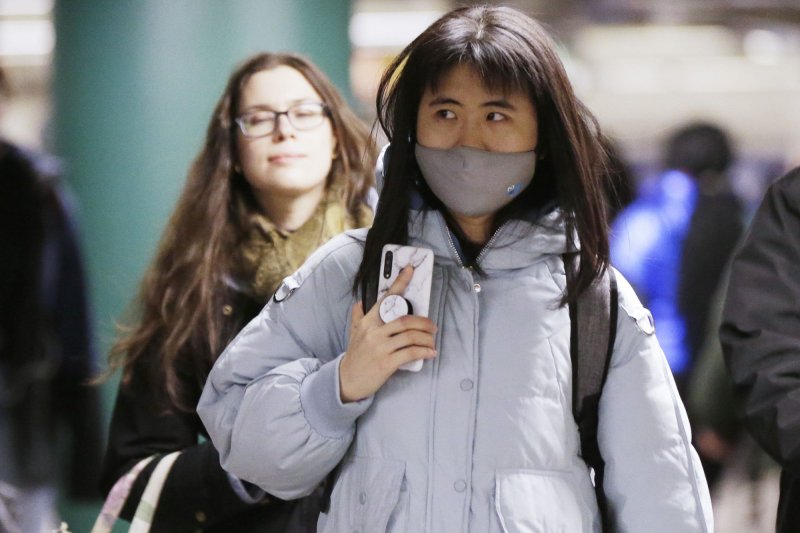A woman wears a mask covering her mouth and nose while walking through the subway in New York City on January 27, 2020 in New York City. 106 people have died and more than 4,500 cases have been confirmed in mainland China, as the Wuhan coronavirus spreads across Asia and the rest of the world. Photo by John Angelillo/UPI |
License Photo
Jan. 28 (UPI) -- The United States is ramping up its response to the 2019 novel coronavirus as it continues to spread, U.S. government officials said Tuesday, as they expand airport screenings and develop potential vaccines and drug treatments for the disease.
Multiple agencies are engaged in efforts to stem the spread of the virus beyond the five initial confirmed U.S. cases, all of which involved people who had traveled to Hubei province in China, ground zero for the virus.
The CDC on Tuesday announced plans to expand screening of travelers from China for the virus from five to 20 international airports across the country, and United Airlines became the first U.S. carrier to cancel flights to China as it suspended 24 flights scheduled for the first week of February.
"To better protect the health of the American public during the emergence of this novel coronavirus and based on evolving information from China, CDC has reassessed its entry strategy," CDC director Robert Redfield told reporters at a press conference.
Anthony Fauci, director of the National Institute of Allergy and Infectious Diseases, said that agency researchers are developing a vaccine against the virus, using information on its genetic make-up gathered by Chinese authorities. The vaccine could enter initial clinical trials for its safety and efficacy within the next three months, but it's likely to be several months, if not longer, before it's available for broad use.
The exact timetable for a vaccine to be released will depend on how the outbreak evolves over the next several months, Fauci said. He added that NIAID researchers were far along in developing a vaccine against SARS in 2005 when that outbreak was eventually brought under control.
Redfield, however, said the 2019 novel coronavirus, or 2019 n-CoV, outbreak is far from under control -- at least in China. To date, he said, the country has identified more than 4,500 cases. The death toll from the virus is now 100, all in China.
Health and Human Services Secretary Alex Azar acknowledged that this suggests a high death rate with the virus, although he added that this is likely because only the most severe cases have been identified.
Officials at all three health agencies said they are also cautiously optimistic that an effective treatment for 2019 n-CoVcan can be identified. Fauci noted that clinicians in China are already using Kaletra, an antiviral used in the treatment of HIV, in patients with 2019 n-CoV, despite a lack of clinical evidence supporting its use.
NIAID, using virus samples obtained from the five confirmed cases in the United States, are assessing the effectiveness of Kaletra as well as another antiviral, Remdesivir, a drug developed initially to treat Ebola.
They are also working with multiple monoclonal antibodies, a class of drugs that has shown promise against Middle East Respiratory Syndrome, or MERS, another member of the coronavirus family.
The agency is assisting the State Department in efforts to "repatriate" some 240 American citizens in Hubei back to the U.S., Azar said. Plans currently call for these citizens to take a charter flight to an airport in California, where they will be screened for the virus.
"Americans should know this is a potentially very serious public health threat," Azar added. "But at this point, Americans shouldn't worry about their safety."
United Airlines on Tuesday also said it would suspend 24 flights between the United States and China, starting in the first week of February. The airline is the first to cancel flights because of the ongoing outbreak.
In a statement, the airline said, "Due to a significant decline in demand for travel to China, we are suspending some flights between our hub cities and Beijing, Hong Kong and Shanghai beginning February 1 through February 8. We will continue to monitor the situation as it develops and will adjust our schedule as needed."
Affected airports include San Francisco International, Newark Liberty International, Chicago O'Hare International and Washington Dulles International.
American, Delta and United, U.S. airlines that serve China with direct flights, have offered waivers to travelers not wishing to take planned trips to several cities, including Beijing and Shanghai, enabling them to cancel or postpone their flights without penalty. The waivers and restrictions differ between carriers, so travelers are advised to check with the airlines.















